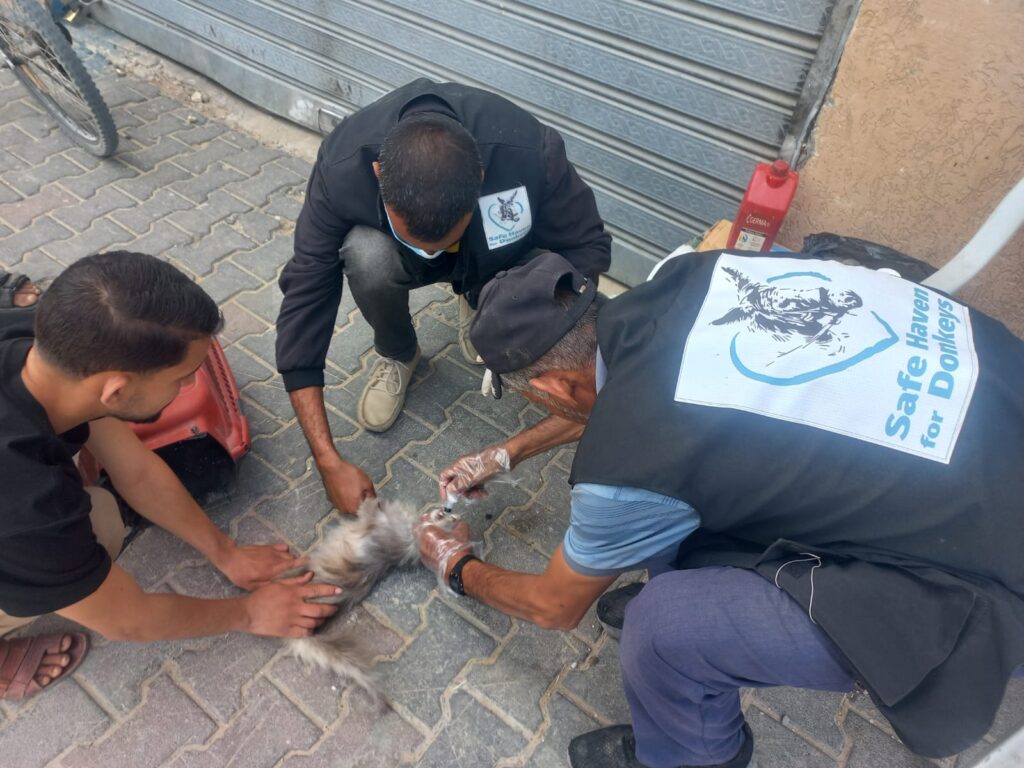Dr Saif, who is in charge of our mobile first aid clinic in Gaza, regularly sends us messages about the conditions the team are experiencing as they struggle to treat as many donkeys, mules and horses (and other animals) as they can.
Extracts from some of these messages are below – please note that some of the text, videos and photos may be upsetting.
To read some of the messages sent by our supporters to the team, please click here – to send your own message of support, please e-mail info@safehaven4donkeys.org
28 October 2025
The people of the north of Gaza welcome us not with mere smiles, but with warmth that melts the weariness of our long journey. They greet us with respect, for they have come to know who we are — the healers of the voiceless, the guardians of mercy in times when mercy itself seems to flee.
Today, we, Safe Haven’s Gaza team, are no longer a name — it is a beacon, a symbol of compassion that travels ahead of us wherever we go. Even officials at the Ministry of Agriculture know us well; they speak our name with gratitude, guide our steps toward the most vulnerable areas, and help us steer clear of those “red zones” where one wrong turn could ignite disaster.
They recognize us — not by our badges or words — but by the dust on our clothes, the sun upon our faces, and the light of purpose in our eyes. And as the cries of suffering animals grow louder, I called upon my brother Ahmed — Mohammed’s identical twin, the same brave soul who was injured last year while bringing us medicine through the fire and fear. He did not hesitate. He came — as always — when duty called. As a volunteer, he worked hand in hand with us, treating one case after another, never pausing, never complaining.
Since morning, dozens of donkeys and horses have been treated, yet our work is far from over. Many still await their “special visit” — those silent creatures whose eyes plead for help where words cannot. It may sound ironic, but it is painfully true — even our bicycles have grown weary, their wheels refusing to turn; the motorcycle breathes its last. Yet our spirit — our unyielding spirit — refuses to break.
And still we move — on tired feet, sometimes barefoot, sometimes bleeding, yet we move. This is no exaggeration, no metaphor spun for pity, or pride, but the bare, trembling truth etched upon our bodies. From camp to camp, from village to village, we wander like a small unit of hope threading its way through dust and despair, following the faintest cry of life that trembles through the silence. Where there is pain, we arrive; where there is breath, we bend low to save it. For in every frightened gaze, in every fading heartbeat, we find the reason we still rise each dawn — weary in body, unbroken in mercy. We shall always be the voice of the voiceless and hope of the hopeless.
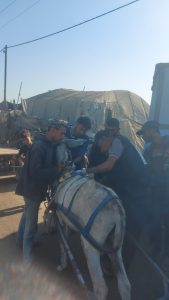
14 October 2025
We are truly grateful that the war has finally come to an end; however, the situation remains horrific.
With the movement of people returning or seeking help, our mobile clinic has been receiving an overwhelming number of requests from different areas. This has placed a heavy responsibility on our small team. so far, we have received 213 requests for special visits to urgent cases. Unfortunately, it is not possible to respond to every single case at all once, but we are doing our very best – prioritising the most serious and critical situations. I am thinking of new work strategies to help us response to all the cries we’ve received and are receiving. It is very challenging. Yet, we are committed to continuing our efforts to help the traumatised and sick animals, despite the challenges.
So far, since we began our clinic around 17 months ago, we have treated more than 14,000 animals, which is an extraordinary number for a team as small as ours. But we have achieved this through determination, love for our mission and a deep sense of responsibility to respond to the cries of the voiceless.
Thank you for your kind support, care and concern. It truly means a lot to us in these difficult times.
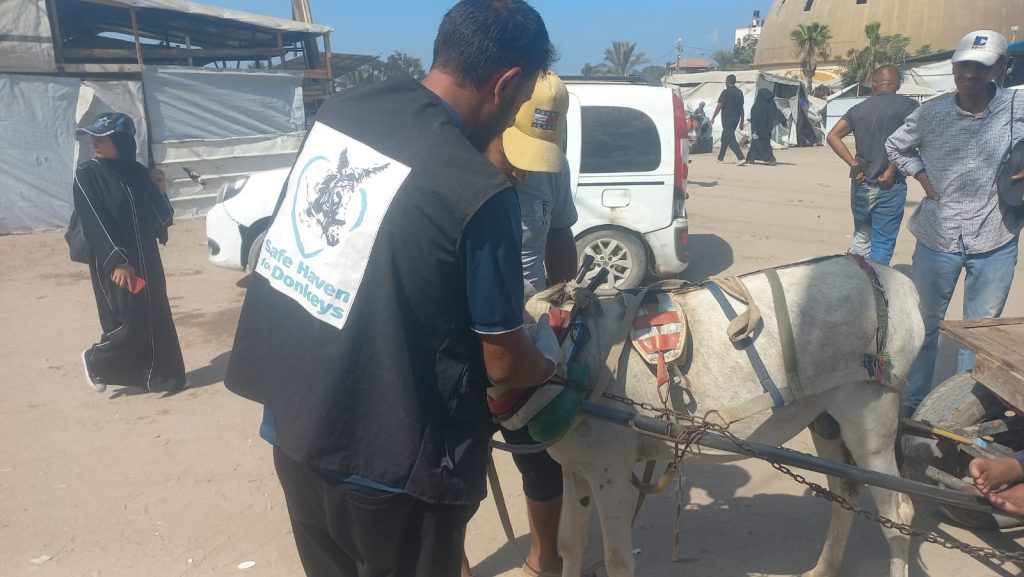
30 August 2025
These days we walk with breath held tight, with bodies heavy from exhaustion, yet we keep moving—for the voiceless who cannot speak for themselves. Case after case reaches us, and it has become not only our duty but our destiny to go to them. They cannot come to us. Their legs tremble with weakness, their stomachs are caves of emptiness, their eyes mirror hunger. They are starving to death before our very eyes.
Now my brothers—Mohammed, Ahmad—and I are “hitting nails with bare hands” to find medications. It is a proverb, but for us it is reality: every strike against impossibility costs us blood and strength. By grace and struggle, we have managed to secure some essential medicines, still keeping a fragile line of life open for the animals. We are struggling, yes, but in struggling, we are also discovering new wells of resilience.
My people are generous beyond measure. Yet in the harshest trial we have ever faced, they must first fight for their own survival. Medicines, once shared freely, now vanish into the black market. Those who still hold them ask for prices ten, twenty, fifty times their worth. I do not blame them, for hunger bends the noblest of souls. And still, we go on searching—searching in alleys, in ruins, in dangerous paths—risking ourselves because we cannot abandon the lives entrusted to us.
Just now, I sat with my brother Mohammed. We spoke of the medicines we must secure for next month’s operations. He said to me: “Saif, I will go back to our village and bring the rest of what we need.”
I looked at him, and my answer was final, unshakable: “No, Mohammed. Never. Not this time.” For I know, with a certainty carved in my bones, that if he goes now, he will not come back again. And we cannot, we will not, lose him.
So the journey fell to another path. From Khan Younis to Al-Nuseirat camp—fifteen kilometers of uncertainty—my brothers now travel, carrying the weight of hope on their shoulders. Their destination: the shattered farm of a veterinarian who, with his clinic, was struck and silenced forever. Through his widow, through the remnants of what war did not yet consume, we will bring back the medicines still hidden in the dust of his demolished home.
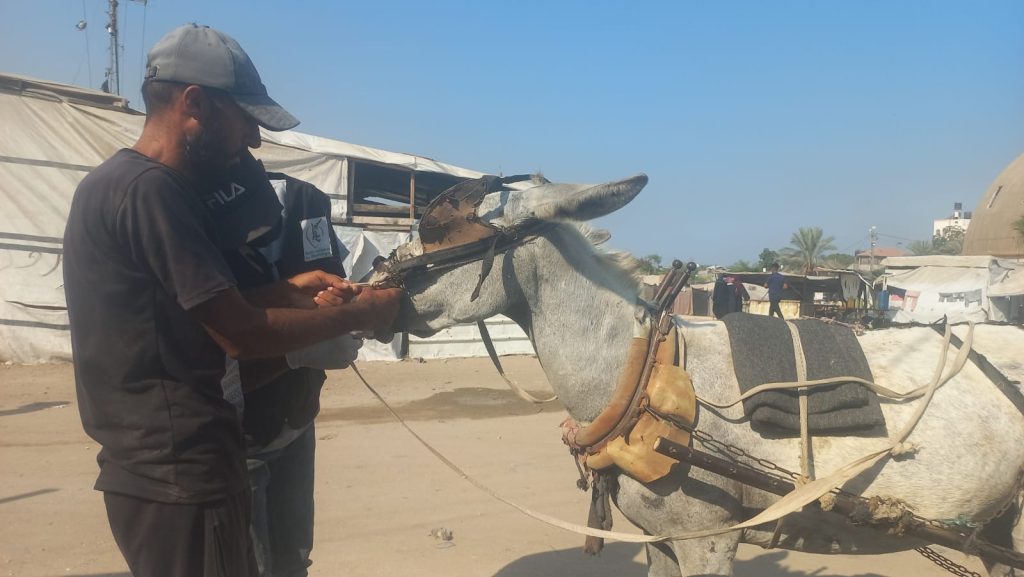
9 August 2025
Today was supposed to be a day of hope.
We have 37 urgent appointments – people have been calling us over the past two days, pleading for us to come and check on their weary, hungry and suffering donkeys. We set up our clinic in the nearby Al-Quba neighbourhood, 1km away from the Mediterranean Sea. Our mission is clear: we brig relief to these silent, patient creatures carrying the burdens of their people.
But as we started our work, a blow heavier than anything we had faced. An attack had struck the area where our dear friend and team member Mr Jyhad’s family lives. He left us mid-task, disappearing into the chaos, rushing towards the hospital to find out which pieces of his life are still breathing.
Since then, there has been silence. His phone is off. My calls go unanswered. And still – we are working. We have been treating these donkeys with trembling hands, every bandage wrapped and every wound cleaned under the shadow of fear for our friend. We will finish tending to these 37 animals because their lives matter too. But when the last donkey is seen to, we will go and search for our brother Jyhad – to hold his hand in grief, or to carry his burden if it has become too heavy to bear alone. Please… keep him, his family and all of Gaza in your prayers,
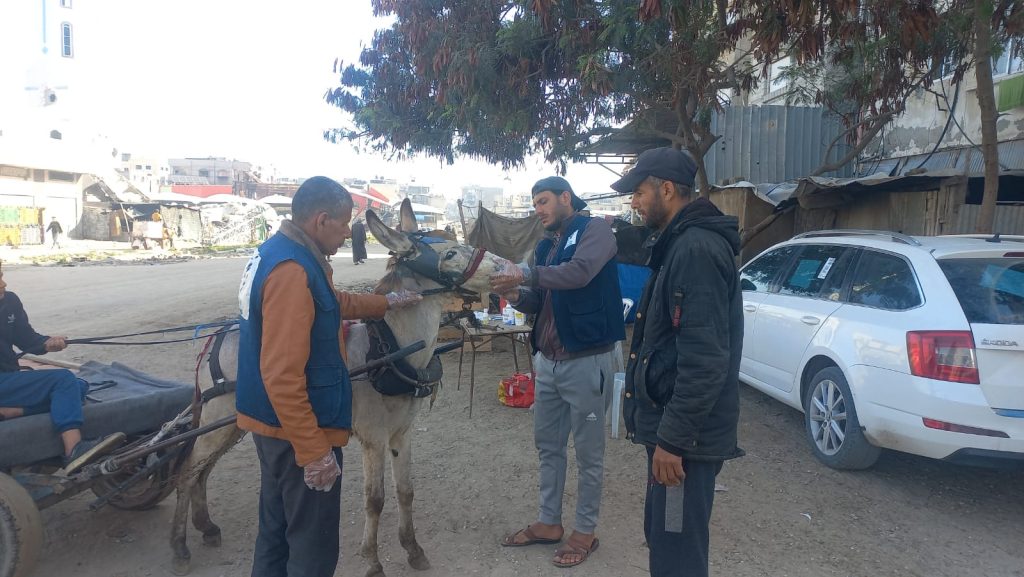
4 August 2025
These are some recent photos and videos from our mission—a glimpse into the silent war we fight daily, not with weapons, but with compassion, bandages, and broken hands holding even more broken hearts.
We have treated many animals in the past few weeks—most of them donkeys, exhausted, emaciated, standing on the trembling edge between life and death. Against all odds—despite starvation, relentless bombing, and a medical supply chain that’s barely breathing—we’ve pulled them back from that edge. One life at a time.
We are fighting to save what little can still be saved, clinging with trembling hands to those who have no voice, no shield, no help but us—the abandoned, the forgotten, the voiceless.
Just yesterday, we received a desperate call from Mr. Niddal, his voice cracking:
“Please—my donkey, my only companion—he’s suffering, in agony… please help me.”
We were at Al-Qubah, 1.8 kilometers from the Mediterranean in Khan Younis, trying to treat another injured horse. But as soon as we had treated that horse, we dropped everything and rushed.
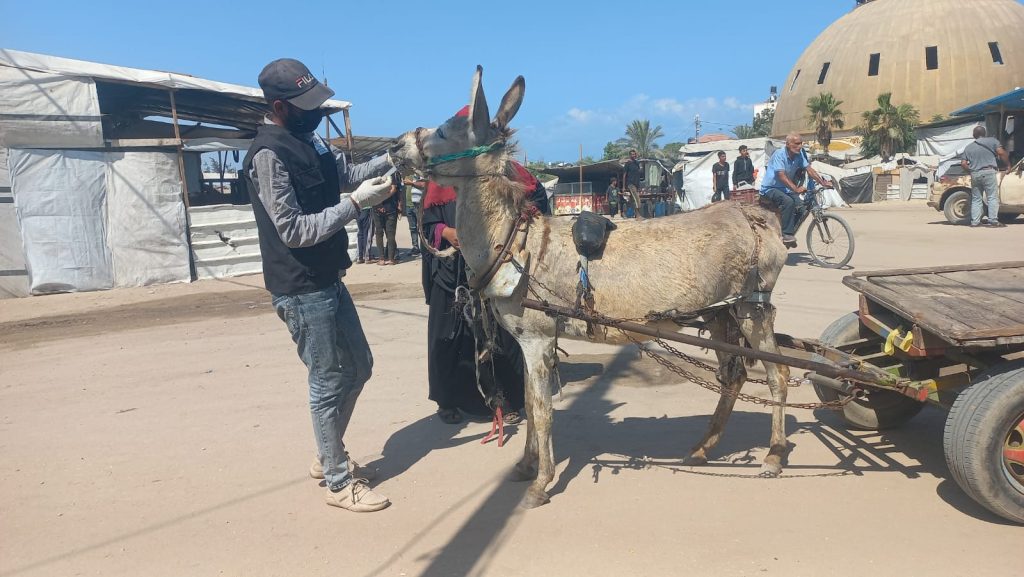
17 July 2025
Dear kind-hearted friends,
Beneath the collapsing skies of Gaza, where screams are swallowed by dust and silence, animals—especially donkeys—walk where no ambulance can reach. They carry not just water and food… they carry wounded souls, shattered dreams, and the unbearable weight of human suffering. They are the forgotten frontline heroes. While the world turns away, they stay—pulling carts through rubble, standing beside grieving children, enduring terror and fear with no shelter, no medicine, no voice.
At Safe Haven’s Gaza Mobile Clinic, we do not watch from afar—we live in the fire. We are here, every single day—not just working, but sacrificing: our time, our safety, our breath, and sometimes… even our very lives. We walk into the smoke where no one else dares, because the voiceless are waiting. The forgotten, the wounded, the terrified—those who cannot speak for themselves.
We don’t just rescue animals. We rescue dignity, rebuild trust, and restore hope where everything else has been reduced to ash.
But we can’t do this alone. Every dose of medicine retrieved. Every donkey treated. Every bleeding paw bandaged. Every trembling creature comforted… It’s all because someone, somewhere, chose to care.
So will you stand with us?! And be part of the voice that breaks the silence. Be the reason we can keep walking into the fire. Because when the world looks away, we run toward the broken. And together, we can make sure they are never forgotten.
You are their voice. Your support is not just a gift. It is a rescue. Every act of generosity you offer becomes medicine. Becomes water. Becomes a life saved from fear, injury, or starvation.
We don’t ask for mere charity. We ask for solidarity. For compassion. For a shared belief that even in the darkest corners of the world, mercy must survive. That even when everything collapses, kindness must not.
We cannot do this without you. Your hand is the one that lifts us when we collapse. Your care is the one that gives these voiceless souls a chance to live. In a place where so many have turned away, you have never left us.
Please, stand with us. Speak for the voiceless. Be the light in this overwhelming darkness. Every gesture you make reminds us—and them—that they are not forgotten.
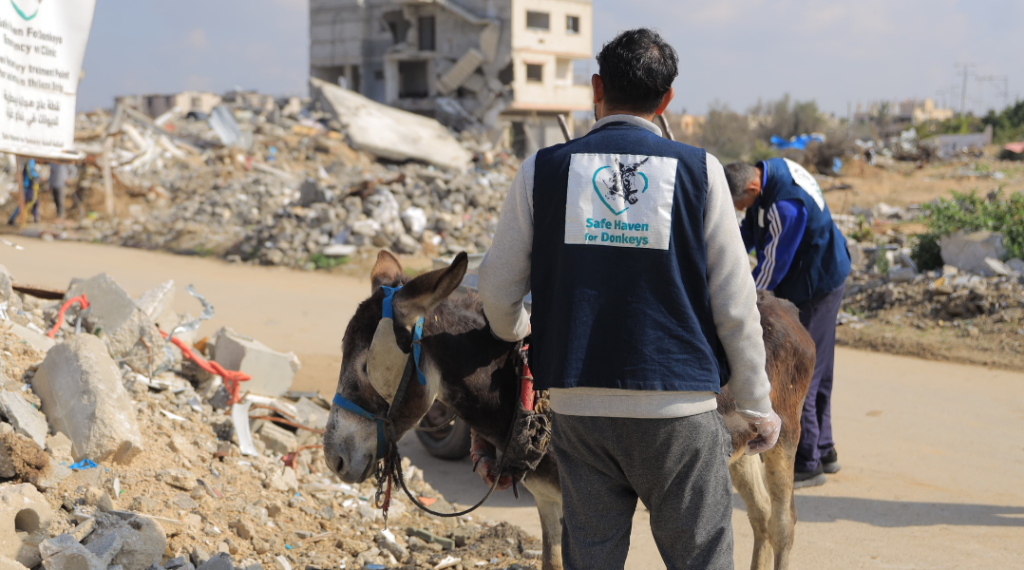
15 July 2025
I truly cannot find words strong enough to thank you for all you have done – and continue to do – especially during these difficult times. We are working tirelessly on several fronts, following different plans to help as many desperate animals as we can. Much of our effort is now focused on purchasing medications, which have become extremely expensive and difficult to obtain. For the past three days, we’ve been on a continuous missing to gather enough medication – and I’m happy to share that we have finally managed to secure what is needed, until the next time the search must begin. Your support has made this possible and we are forever grateful.
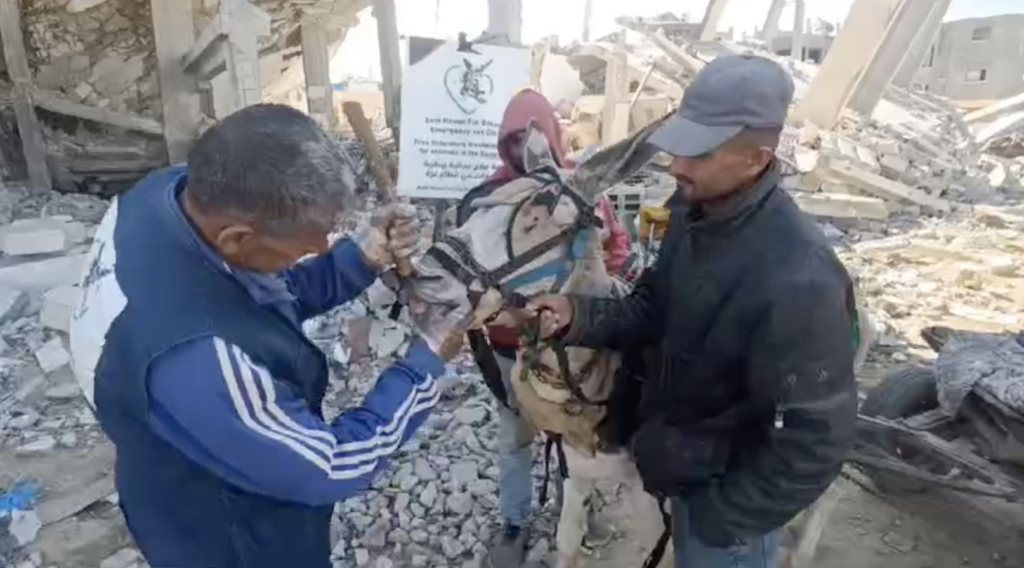
9 July 2025
Recently, a fourteen-year-old boy reached out to us with a trembling voice and a desperate plea: to save the last surviving horse of his late father’s once-glorious Arabian stables.
His father—once a man of dignity and means—was taken, along with his horses, his home, and his past. Only one noble creature remained. And on that terrible day, as the boy fetched water for his mother and siblings, a sudden explosion shattered the silence. A shard of metal—small, cruel—pierced the horse’s sensitive nose. A wound like that, left untreated, could have ended the animal’s life.
We had no ambulance, no road access to get this very mission done—but we have a bicycle and a mission. We cycled through danger, carrying only love, courage, and the basic tools of mercy. We removed the shrapnel, cleaned the wound, and administered antibiotics to prevent infection.
The boy, eyes shining with relief, whispered words I will never forget:
“This is the last thing my father left us. It’s all the legacy left. I often sleep hungry just to feed him. You have not just saved a horse, but the last breath of my father’s memory and legacy.”
In Gaza, survival is not just about people—it’s about the souls they love. And in saving this horse, we’ve actually saved something sacred: legacy, love, and the enduring spirit of a child too young to carry so much loss.
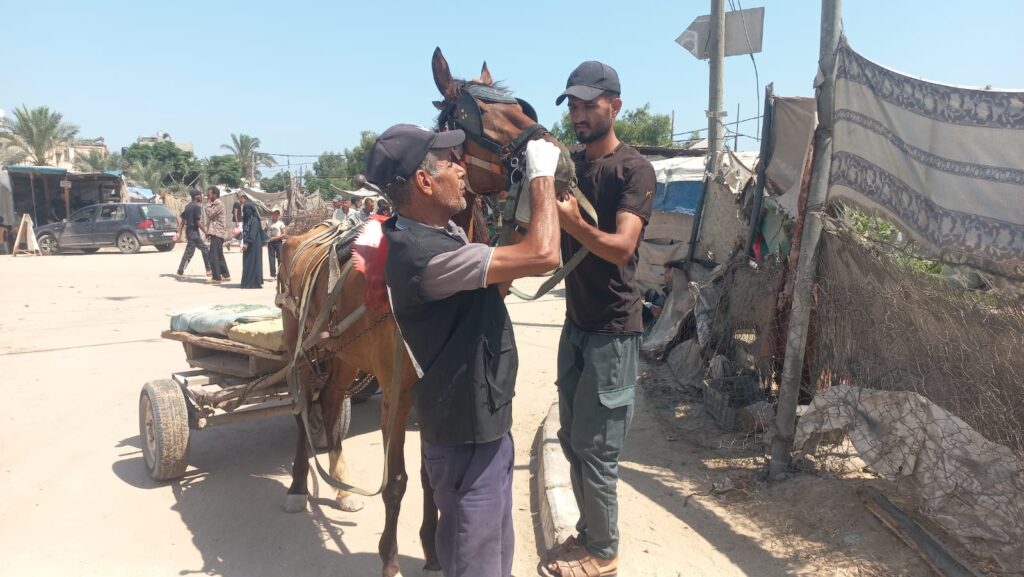
28 June 2025
Hi everyone! I have much to share with you. Let me start with our hero, Mohammed’s story. It is hard to find the words to describe what my brother Mohammed endured. He went out—not for himself—but for the sake of life, to retrieve the precious medications I had hidden away, protected from the cruel sun, preserved for our mobile clinic and the animals we treat with our hearts.
The journey was not a journey—it was a crossing through ‘demise’. A village once familiar became a prison, and the road he took became a battlefield. Yet Mohammed did not hesitate. He knew what was at stake. Then his voice came through, trembling but alive, carried by mercy. I have translated his words word by word to communicatively convey his message to you and the world. “Dr Saif, thanks to God, I went to retrieve the medications, I am holding it.” Mohammed lost 7 friends that day but walked through that horror carrying hope in the form of medicine, clutching it like a sacred trust. That medication was not just medicine. It was salvation. This is the cost of compassion.
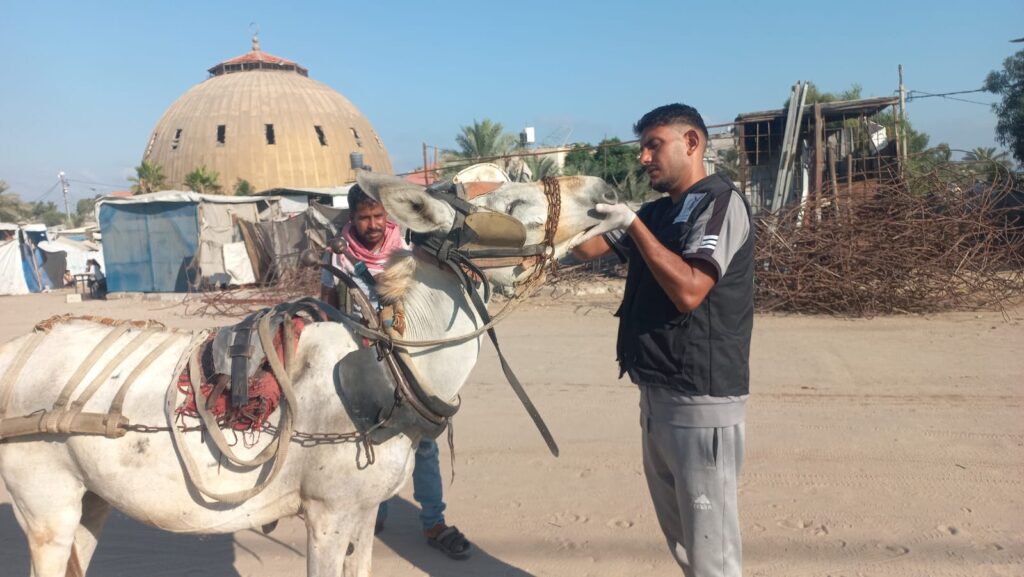
23 June 2025
Hi everyone, and good morning from the land where the sun rises over shattered glass and sets behind ashes-covered tents—where every breath we take is borrowed from the ruins of the past. A deep pain buried in my memories moves my fingers to write and write—like a heavy rain that finally breaks, letting everything inside me flow out without control. I write to you not merely with an update, but with a testimony carved in suffering and lit by courage. These are some images and videos of our relentless work. We miss you all, and while there is so much to say, words often tremble under the weight of what we carry. Still, I will try.
Every day in Gaza is a volume of lived agony and unyielding resilience—not fantasy, not fiction, but flesh-and-blood facts soaked in dust and heartbreak. Today, I want to speak of those whose cries are silent, whose suffering is often unseen: our beloved animals—especially the noble donkeys and equines, creatures of service now abandoned in suffering.
Let me first unveil to you the theatre of our daily battle—not the mission itself, but the war that begins before the mission starts. At 4 a.m., while the world elsewhere is still dreaming, we begin our hunt for water. No taps. No tanks. Just blistered feet, jerrycans, and a trail of sweat. We walk 1, 2, sometimes 5 kilometres just to fill a few litres of mercy—donated by kind souls across oceans. We haul these drops of life across burning sands to our tents—tents that neither shield us from Gaza’s blistering heat nor the piercing cold of night. Mere fabric, trembling beneath the sky, exposed to shrapnel, mosquitoes, and madness.
By 6 a.m., we begin our second mission: the battle for fire. We search for wood, bricks, scraps of war—anything to boil water or cook anything (if found). Then, without pause, begins the third act: our mission. At 8 a.m., fatigued but fierce, we make our way to the mobile animal clinic, answering desperate calls from animal owners whose companions lie dying of hunger and injury. We work until the afternoon sun collapses behind ruins. And then the fourth battle begins: the search for food. A slice of bread becomes a treasure. A cup of rice, a miracle. Meat, fruit, chocolate—these are dreams we can only eat in sleep. Yes, only in sleep or maybe one day in heaven!
When night comes, we collapse. Yes, we do!! Not into sleep—but into breathless silence. We sprawl across the bare ground, too exhausted to dream, our souls whispering only this: “Live one more day.” And yet, we go on.
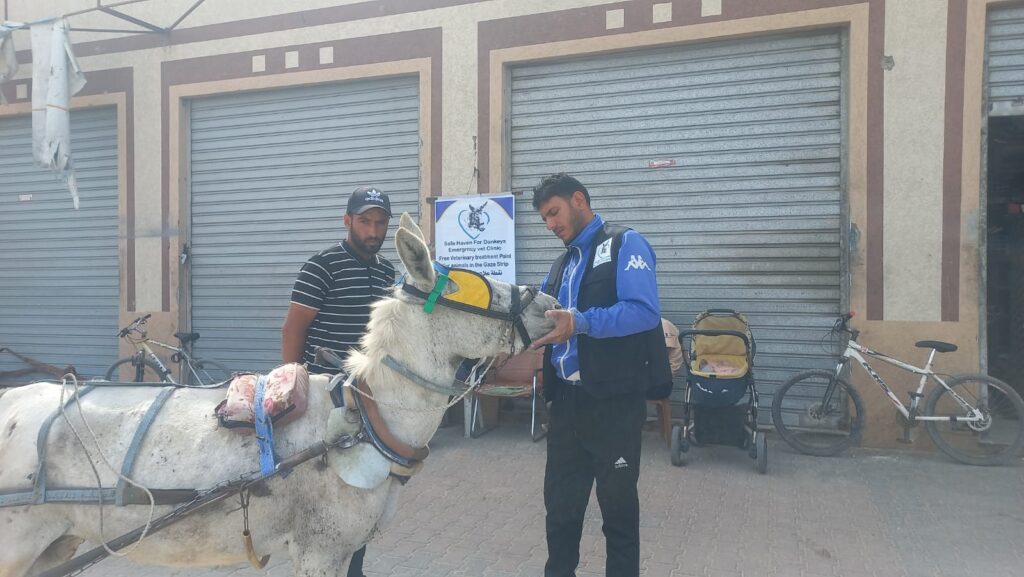
5 June 2025
I don’t even know how to begin—for some mornings, the weight of what we carry is heavier than words can hold. Let me start with a glimpse of our team’s condition after the latest evacuation orders turned life upside down once again. We are scattered across a land of sorrow. Two of our team members now live on the shores of the Mediterranean—not in homes, but in makeshift shelters where the sun scorches with merciless heat, flies swarm endlessly, and privacy is a memory long lost. Another lives in Deir Al-Balah, and one more in Al-Qararah—a town nestled between Deir Al-Balah and Khan Younis. To reunite and operate, we ride bicycles across shattered roads and broken dreams. It takes us one to two hours of cycling, and often we must dismount, lifting our bikes over rubble and weaving through debris, remnants of homes, lives, and history. We walk the path of the unknown—roads where many before us have perished—roads that offer no promise of return. We tread carefully, silently, as if every stone could be our last. We live in a reality where life can vanish in the blink of an eye. Still—we are here. We are working. We are saving lives. Just this week, despite all odds, we treated 139 animals—72% of them were donkeys and horses. These noble creatures, who once bore the weight of livelihoods, now bear the burden of starvation and silent agony.
The famine has devoured their strength. We see:
• Severe emaciation and muscle loss
• Hoof rot and cracked, infected feet from walking unshod on rubble
• Collapsed veins, dehydration, parasites
• Open wounds that (may) not heal because their bodies have no strength left to repair They cannot work. Some cannot even walk. Some fall while standing. And yet—they look at us. And in their eyes, we see stories more painful than war. You don’t need a medical report. Just meet their eyes. You’ll read volumes of sorrow. You’ll feel your pen beg to write their story, just by the language of their gaze. That is not exaggeration—that is the softest truth I can share. We are not heroes—we are merely doing what must be done. This week, we rushed to 13 emergency calls from families begging for help. Sometimes, we arrive too late. Sometimes, we manage to ease the pain. Either way, we do not stop.
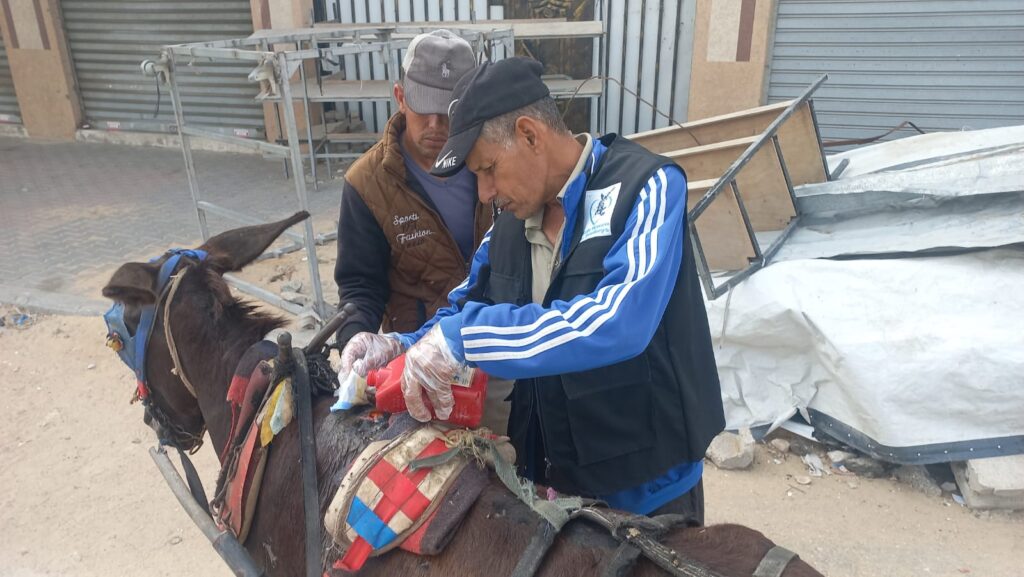
23 May 2025
22 May 2025
The stories we witness are countless and overwhelming, and I honestly don’t know where to begin or what to leave out. But let me share just one. A man searched desperately for two days—not for food or water, but for help for his wounded horse, struck by deadly shrapnel. Amidst chaos and crowds of refugees, he finally found us and cried out, “Finally, I found you… what a relief! I searched everywhere for an animal clinic, but no one was working, no one was there… now I have you. Please help my friend. He has been helping us for years, especially during the war… now it’s my turn to help him.” And we did. We cleaned the wound, treated the injury, gave antibiotics and all the care we could. And when he left, gently holding his horse, he turned to us with tear-filled eyes and said, “You are truly angels sent by God. When no one else is here to help… you are.” This is just one story. One soul. One bond of loyalty and mercy. But it speaks for so many. And we keep going—not because we are strong, but because compassion is stronger than despair.
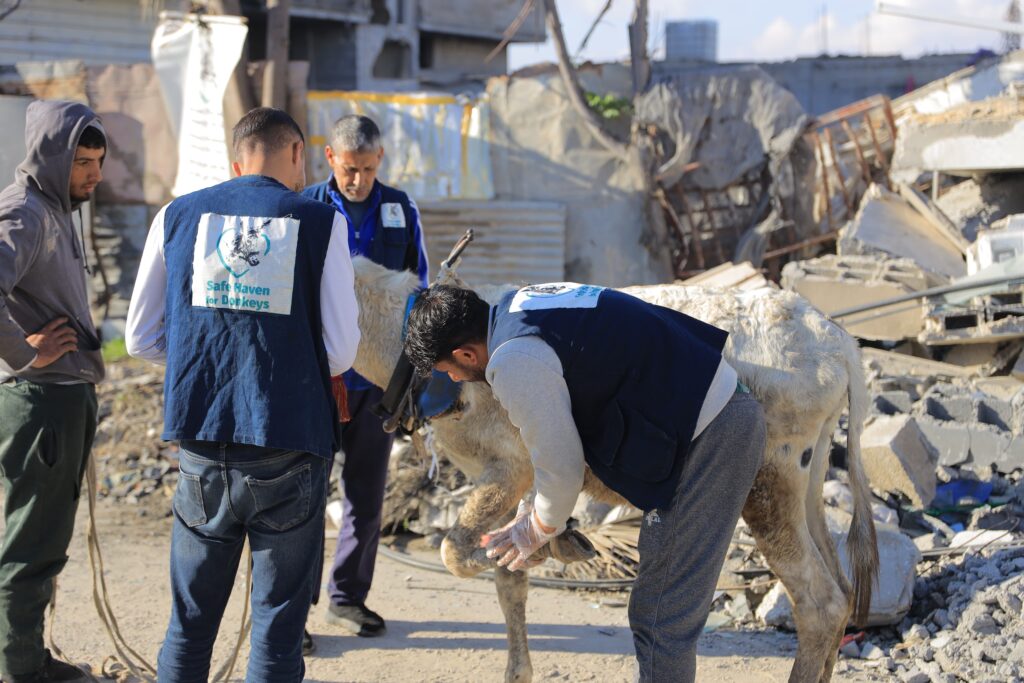
15 May 2025
Earlier today, we met this elderly woman whose story broke our hearts. She had lost her husband… and three of her children in the ongoing War. All that remained of her family was a humble, faithful companion — a jenny and her little foal. These gentle animals were not just livestock to her — they were her emotional lifeline, her only remaining connection to love, memory, and belonging. Desperate and determined, she sought us out — because she knew we would be there. And we were. We are everywhere hope is needed. She approached us, asking for help. While we were treating the donkey, the tears began to fall — quiet, trembling tears of sorrow for all she had lost… and tears of gratitude, watching her last loyal companion receive care and compassion. We treated the donkey with all the love and skill we could offer — and we promised to return for follow-ups, because we don’t treat and leave — we stay, we walk with them. But what moved us most was the smile that slowly appeared on her face. A smile — in the middle of so much pain. A smile born from kindness, connection, and the dignity of being seen and supported. And that smile…that single smile means the world to us.
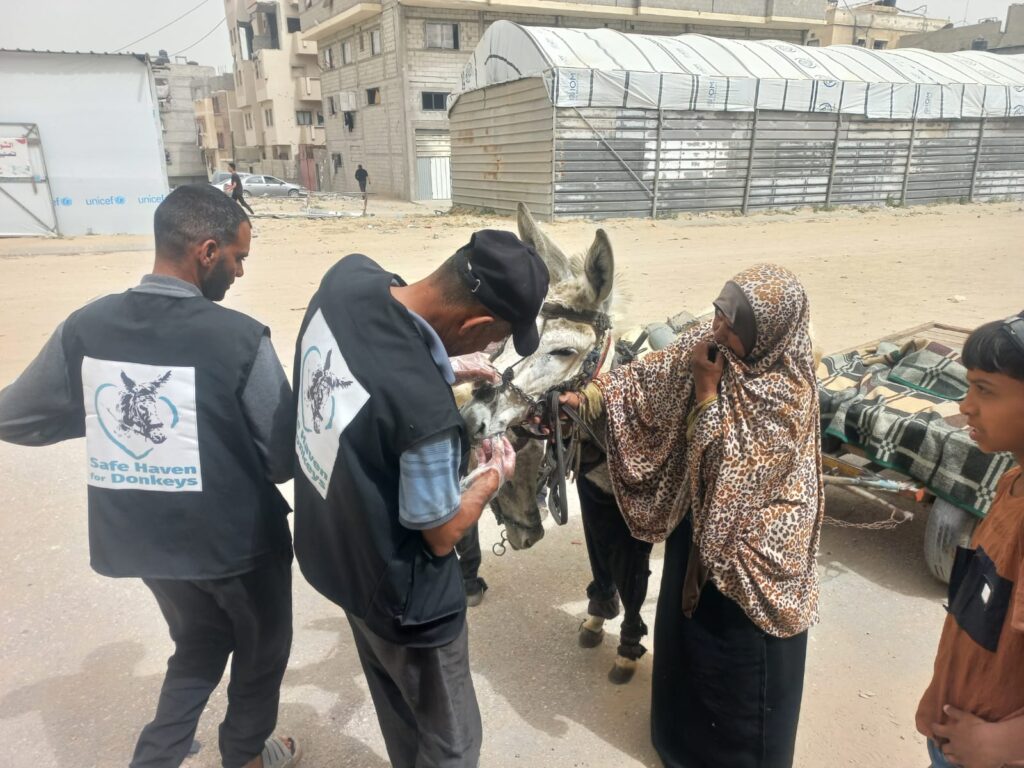
12 May 2025
Yesterday was one of the hardest days we’ve faced!! We were operating in Maa’an, a rural area where we had received urgent calls from farmers pleading for help to treat their animals. Despite the danger and ongoing escalation in the region, we made the decision to go—because when no one else can, we must. While we were on our way to help a farmer whose donkey was severely ill and barely able to stand, a massive explosion rocked the area (Islamic University’s South Campus in Khan Younis) The blast was so powerful, it felt like doomsday had arrived. We were only about 1 kilometre away when it happened. Shrapnel flew in all directions and even reached us—but by a miracle, we were unharmed. Thanks be to God, and to your prayers that continue to protect us. We are still here, still standing—because we must be. We are the frontliners for the voiceless, risking everything to care for the animals who depend on us, even as danger closes in from every direction.
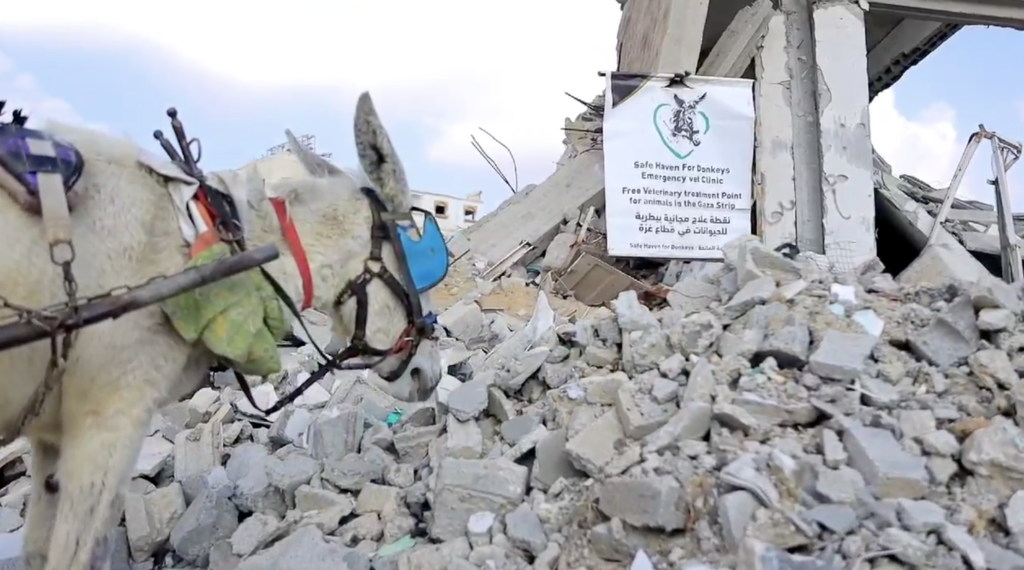
8 May 2025
We are doing the best we can with the limited resources available to us. Every effort, no matter how small, is crucial in providing care and support to those in need. It is the compassion and resilience of individuals and teams on the ground that continue to make a real difference, even in the face of overwhelming adversity. We share in your hope and prayer that a lasting solution will be found soon, bringing peace and an end to the suffering.
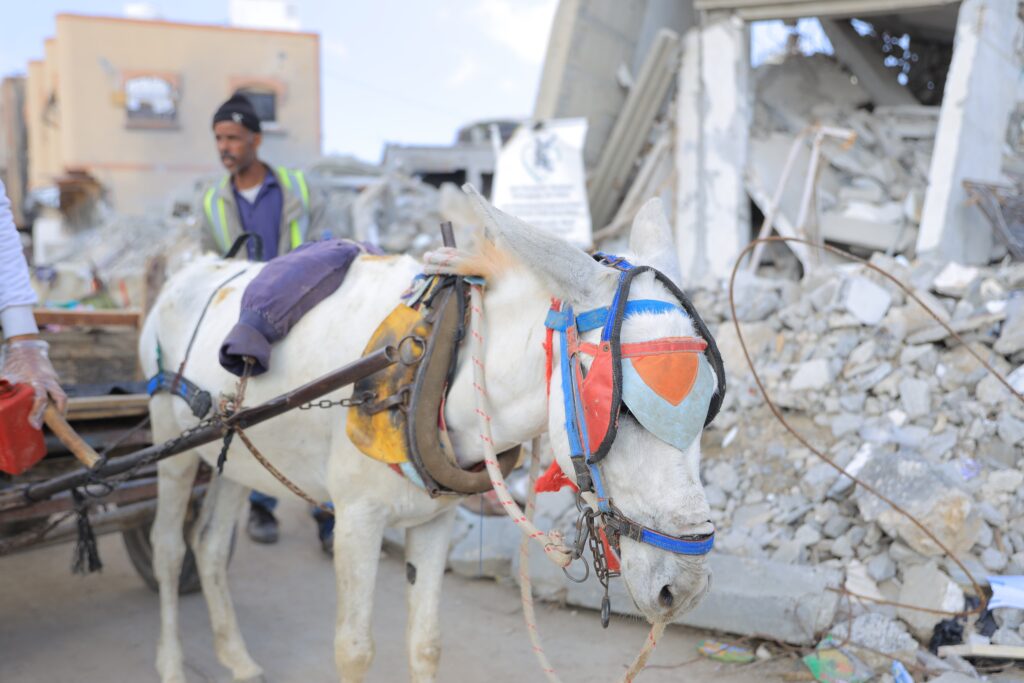
22 April 2025
I’d like to share with you that our day today began with urgent calls from volunteers answering some calls from Al-Qararah Municipality to open some blocked roads in the town. Their animals were in pain—wounded, helpless, and alone. Without hesitation, we responded. Our team rushed to the scene, determined to offer what little relief we could in a place where suffering has become routine. We worked under the open sky, hands deep in dirt and wounds, trying to heal what war and fear have broken. But then—the roar of UAVs shattered the air. The sound grew louder, nearer, menacing. In that moment, I faced a terrible decision: risk our lives to save others, or pull back and protect my team from becoming the next tragedy. With a heavy heart, I told them to leave. Too many lives have already been lost. We could not afford to lose one more, and enough for what we have already lost. But even after retreating from immediate danger, pain found us again.
In a nearby area, safer but still steeped in sorrow, we found a donkey—its body battered, its legs trembling. Mohammed, one of our most selfless team members, moved in to help. As he reached to treat the animal’s wounds, the donkey—blinded by pain and fear—kicked out with force. The blow landed hard. Mohammed dropped to the ground, clutching his arm, the agony clear on his face. But when we rushed to him, his voice was steady. “The donkey was suffering more than me,” he said. That moment broke something in me—and it lit something, too. Despite his injury, Mohammed had nowhere to go. The hospital, overwhelmed with victims of war, turned him away. His pain was real, but in a system drowning in blood and trauma, it wasn’t considered severe enough.
So I called a friend—a doctor with a heart—and he’s on his way to care for Mohammed now. This is the life we lead. We walk into danger not because we are unafraid—but because someone must answer the cries no one else hears. Even when the ground shakes, when the sky screams, and when our own bodies bleed, we keep going. For the voiceless. For the wounded. For the ones who still believe that compassion matters. We don’t carry weapons—we carry hope. And we will not stop. Because every cry of pain is also a cry for help. And as long as we are able, we will keep answering.
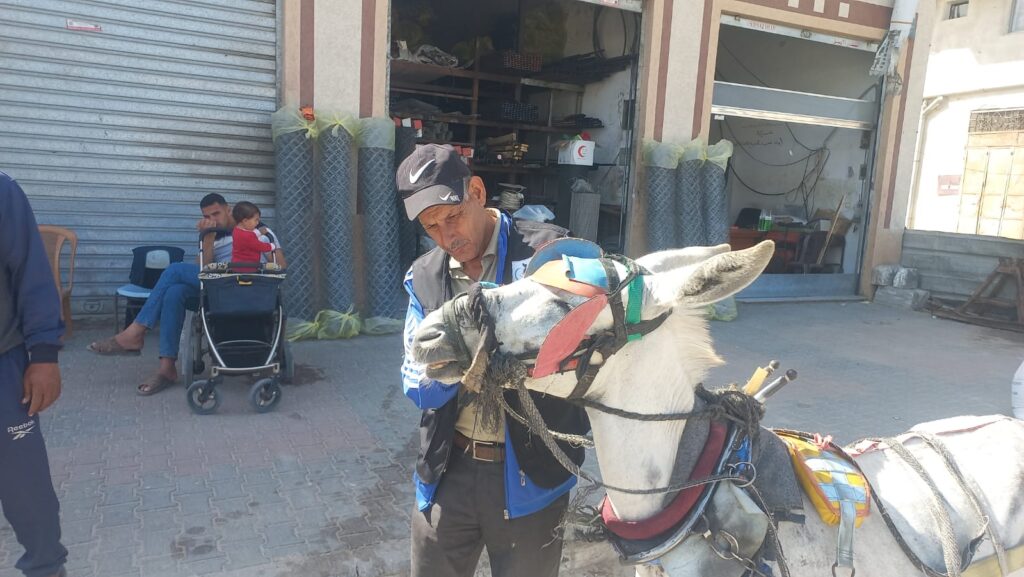
9 April 2025
Thanks to your generosity, we have been able to replace some of our equipment! Here is a breakdown of the tools and equipment we have already secured locally, along with the items we are still trying to obtain. It has been uneasy to replace what we lost, but nothing is impossible!!
A. Equipment and Tools Already Secured Locally:
1. Scissors & bandage cutters
2. Syringes & needles (assorted sizes)
3. Wound cleaning kits (sterile saline, iodine, antiseptic spray)
4. Dressing & bandaging materials (gauze, elastic wraps, non-stick pads, tape)
5. Tweezers & forceps
6. Hoof knives
7. Hoof nippers
8. Rasps / files
9. Farrier hammer
10. Strong folding table – for treatment and organizing supplies
11. Foldable exam mat / sheet
12. Water containers (for cleaning, wound care, and hydration)
13. Plastic bins / buckets
14. Medical supply boxes
15. Waste disposal bags & boxes
16. Hand sanitizers / disinfectants
17. Face masks & gloves
18. Uniform vests / jackets with the charity’s sign logo – already distributed to staff
19. Rain coats
20. Basic first aid bags
21. Fuel supply despite being very expensive – we purchased for urgent calls, night operations, and immediate evacuation needs
B. Equipment Still Needed (Costly and Limited in Gaza)
These items are expensive and uneasy to find at the moment, but we are doing our best to locate and secure them:
1. Stethoscopes
2. Thermometers
3. Additional strong folding table (second one for larger setups)
4. Cooler box – for safe storage of sensitive medication
5. Portable tarpaulin / shade tent – to shield staff, animals, and equipment, and also to mark our mobile clinic’s location as we move from one area to another
6. Flashlights / headlamps (with batteries)
7. Basic vehicle tools & spare tire.
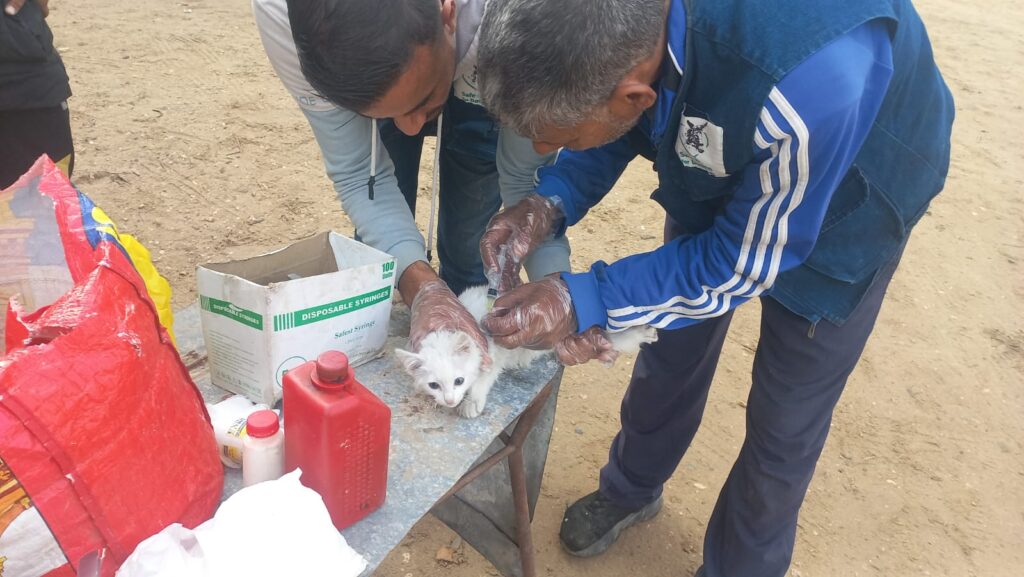
26 March 2025
Last Thursday, our team miraculously survived a brutal attack that targeted our base in Khan Yunis—the very place where we operate and where so many people come seeking our help. We were incredibly lucky… we had left just moments before the area was completely annihilated. We were on our way home when it happened. We lost everything—our medications, uniforms, and essential tools that we rely on every day to continue our work. I didn’t want to worry you by telling you immediately, but now I feel it’s important to share. Despite everything, we refused to give up. I have been doing everything possible to gather new medications and tools so that we can resume our mission and continue saving lives—no matter how hard it gets. Our uniforms, buried under the rubble, are gone, and I am still searching for a place to buy new ones. I haven’t found any yet, but I remain hopeful. Even in the face of destruction, we choose to move forward. We will not stop. We will not abandon those who depend on us.
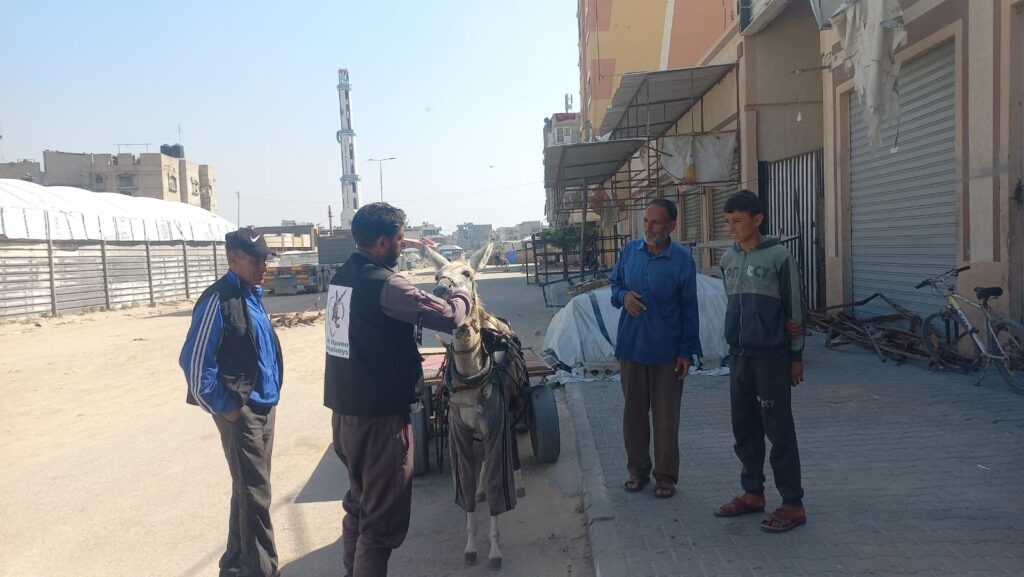
15 February 2025
Hello everyone! Today, our brave team achieved something extraordinary, despite our limited tools and equipment. We received an urgent call from an elderly man in Khuza’a—a town just a few hundred meters from the border, where danger looms at every turn. With a trembling voice, he told us, “While I was returning from my destroyed home in Khuza’a to seek shelter in Beni Suhaila, my donkey was hit by a bullet. Now, it can’t walk.” He paused, then added, “My only hope is that Safe Haven’s team will come and help my donkey.”
When we arrived, the scene was heartbreaking!! The donkey, a lifeline for this old man, lay helpless, its leg broken and in pain. The team immediately sprang into action, carefully cleaning its wounds, setting its broken bones, and applying plaster to help them heal. With every touch, we poured our hearts into saving this animal, knowing it wasn’t just a donkey—it was this man’s only means of survival, his companion in a world that has taken so much from him.
As we worked, the old man watched with both happiness and sorrow in his eyes. When we finished, he couldn’t stop thanking us, his voice shaking with gratitude. “You’ve saved my only glimpse of hope,” he said. For him, this donkey isn’t just an animal—it’s his way of moving through the ruins, of finding food, of holding onto some semblance of normalcy in a life shattered by war. We hope his story finds its way into the hearts of many. We’re hopeful the donkey will recover, and we’ll continue to follow up until it’s fully healed.
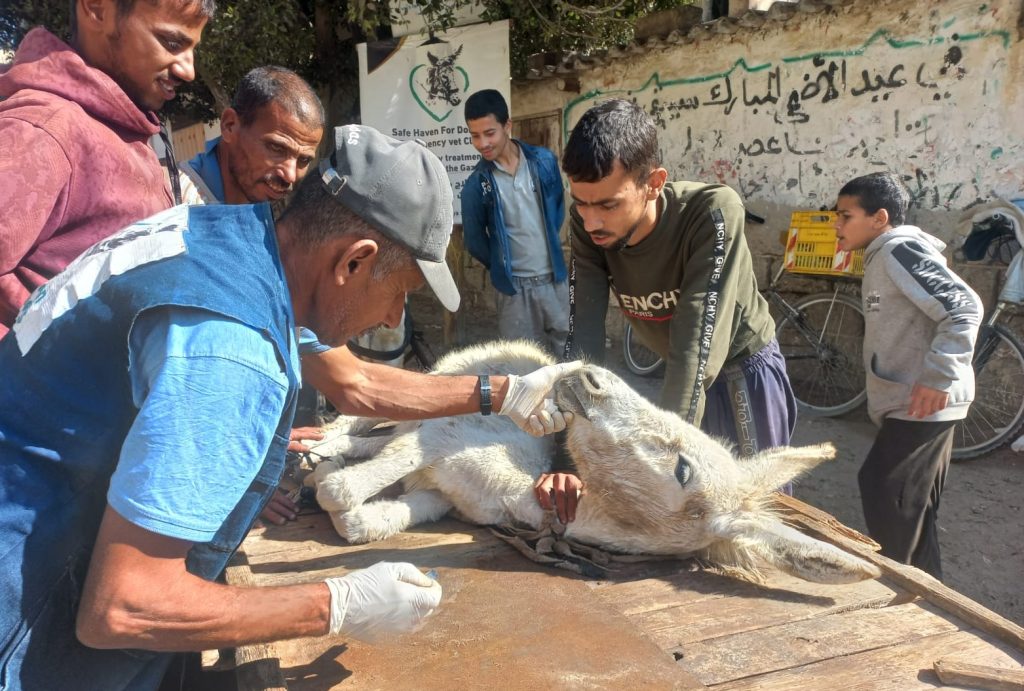
23 January 2025
Our team is now embarking on a mission in an area that was 5 days ago completely inaccessible—the far eastern part of Deir Al-Balah (Al-Matahan), east of Salah Al-Dein Street, which connects Rafah in the south to Gaza City in the north. Words cannot fully convey the devastation and heartbreak we encountered there. The conditions were unimaginable, and the suffering of the animals left us speechless.
The stories we’ve heard from farmers in the area are devastating. Many animals have perished due to the war, while countless others were left untreated and uncared for until we arrived. These innocent lives were hanging by a thread, and now, we are focusing all our efforts on giving them the care they so desperately need.
Despite the overwhelming challenges, we have resolved to push forward—through rain, storms, and anything else that stands in our way. We are here to heal what once seemed impossible to heal. Luckly, our team is remarkable—patient, determined, and fueled by an unshakable love for animals.
Our team has witnessed horrifying scenes that could leave anyone shaken, yet they press on with unwavering courage. Allow me to share with you that our brave team has exemplified unparalleled courage and sacrifice, standing as a beacon of compassion to the world. Even amidst death and fear, hunger and thirst, they have shown unwavering dedication to caring for animals in their time of need. They have treated animals in the most dangerous conditions, where hope seemed lost. This morning, when the team expressed concerns about the severe weather, I reminded them of our shared commitment: no matter the obstacles, we will persevere. This is more than a job; it’s a calling. We are planning to revisit the area, as there is still so much work to be done. While the weather continues to test us, we remain steadfast in our mission to rescue and care for these voiceless companions.
Last August, our team narrowly escaped death and inevitable injuries multiple times. I chose not to share this with you earlier, as I didn’t want to cause you unnecessary worry. During that time, we lost contact with one another for three agonizing days—a true nightmare. By the grace of God, we were eventually reunited and able to continue turning what seemed like an impossible mission into a reality.
I’ll never forget one particular moment that truly embodies the resilience of our team. My brother, Ahmed—who isn’t formally part of the team, but whose unshakable love for animals always makes him available whenever I need him as a volunteer—was once injured while going out to purchase essential medicine for our mission. His selflessness in that moment, just as with every team member, stands as a powerful reminder of why we do what we do. Even in the face of danger, his unwavering commitment to our cause shines through.
I have countless stories to share with you about Gaza’s forgotten animal kingdom, still bearing the scars of suffering. My words fall short of capturing the depth of loss, the moments of triumph, and the immense responsibility we carry. Every animal has a story, and every story is a testament to resilience and survival against all odds.
Safe Haven for Donkeys has now become a popular expression among Gazans, symbolizing hope and care as it means, “Treat your beloved animal for free.” However, I am deeply concerned about the dire conditions of animals in North Gaza, particularly in areas such as Beit Lahia, Beit Hanoun, Jabalia, Sheikh Radwan, Al-Shati Camp, and Al-Zaitoun.
The situation there is beyond belief—indescribable. No charity or organization has ever extended their efforts to care for the animals in these regions. This makes it clear that immediate action is critically important to address the desperate cries of these suffering animals.
Many of my students and friends have shared heartbreaking updates about the horrific health conditions of the animals there. I told them that we are anxiously hoping for a ceasefire to take place so that we can step in and provide the care these voiceless beings so desperately need. Their lives depend on us.
Another deeply heart-breaking story I feel compelled to share is the unimaginable plight of animals in Gaza. Despite their owners’ best efforts to care for them, these animals are finding themselves without food. The harsh reality is that even their owners, who have tried everything possible to feed them, are now facing severe famine themselves. Their options are running out.
Animals—sheep, cats, dogs, and even donkeys—are left to forage for food in landfills, something that has never occurred before the war😓😔😔. It’s beyond words to think that these innocent creatures, who have always depended on human care, are now forced to scavenge through garbage.
This is a heartbreaking reality that many of us could never have imagined. Such suffering is unfathomable, and it leaves us asking: How can these beautiful, innocent animals endure such unimaginable hardship? To witness this tragedy is to be reminded of the depth of the pain being experienced by all in Gaza.
I am deeply saddened, and compelled to share their story in the hopes that awareness brings the compassion and action they so desperately need. We truly hope the voices of these innocent animals reach the entire world, especially Europe and America as well as the Arabian Gulf where there are many generous people with kind heart willing to give a hand if being properly and officially addressed. I firmly believe there are countless people with hearts and spirits big enough to care for these animals in their time of suffering.
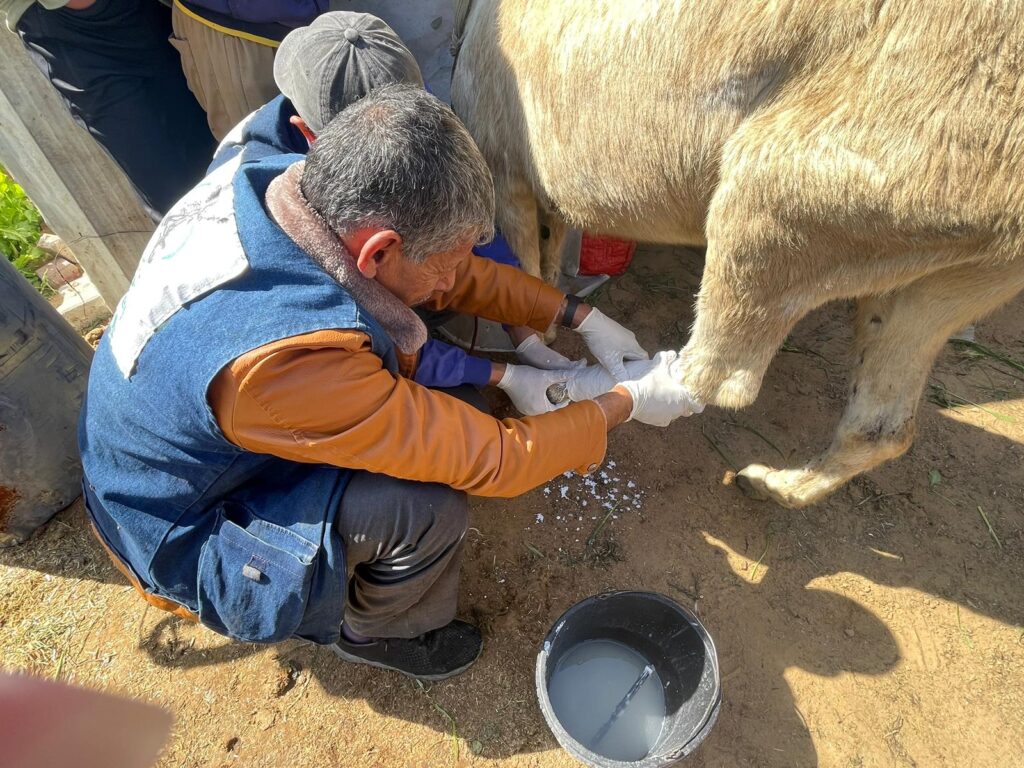
21 January 2025
Today has been both challenging and rewarding as we successfully accessed an area that, until just three days ago, was entirely out of reach. This area in the heart of Rafah, Shabura—once a hub of bustling markets and vibrant life—now lies in ruins. The devastation is so widespread that, I can say, mainly donkeys and horses can traverse the destroyed roads.
In this shattered landscape, we treated a significant number of animals, primarily donkeys, which remain crucial for the survival of local communities. At the same time, calls for help from villagers in Rafah, Al-Qrara, Khuzai, and other nearby regions continue to pour in. The urgency and sheer number of these pleas have been deeply moving, with many people expressing their desperate need for immediate intervention.
Our dedicated team has been working tirelessly, pushing themselves beyond their limits to respond to as many calls as possible. However, the growing scale of need has presented immense challenges. To ensure we reach those most in need, we have begun prioritizing based on urgency and vulnerability, often scheduling appointments to manage the workload effectively.
Our efforts remain guided by data—focusing on areas where animals play vital roles in the community and are most at risk. With the recent treaty in place, we are now cautiously planning to reach previously inaccessible border areas. These regions, which have long been without support from any animal charity, require urgent attention.
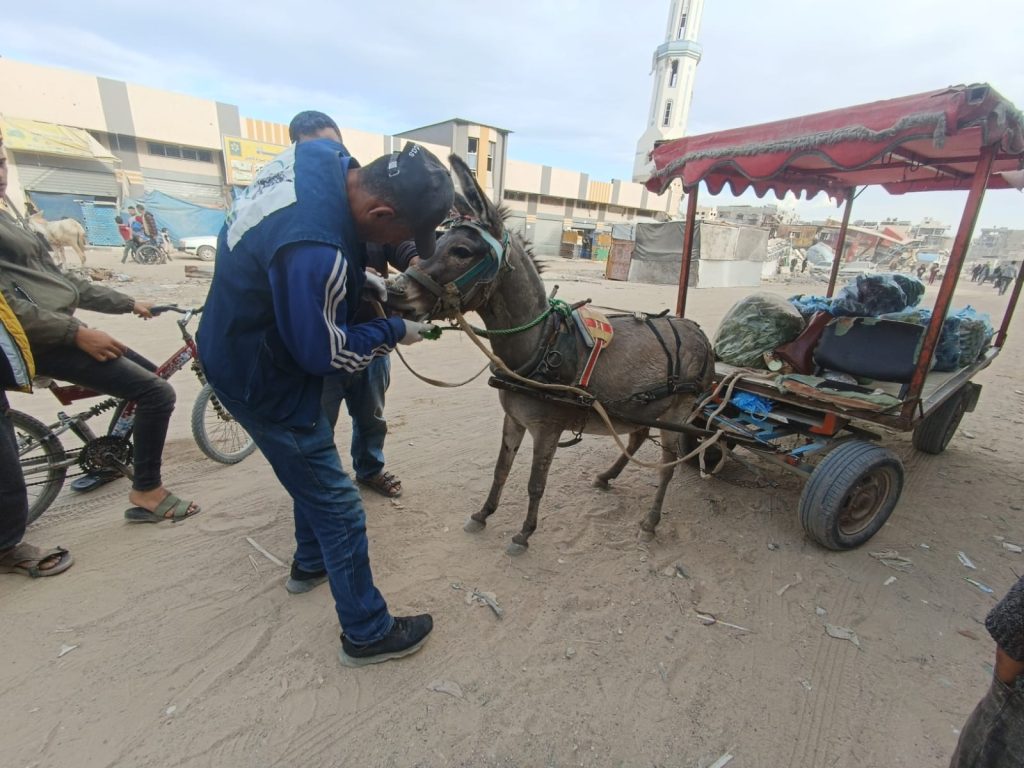
20 January 2025
I’m thrilled to share a milestone that once seemed impossible—we’ve finally managed to reach areas that were previously inaccessible. What we found there, however, was heartbreaking.
A staggering number of vulnerable animals have endured unimaginable suffering due to the horrors of war—innocent beings caught in a tragedy they did not create. These animals are not just physically worn out; they’re emotionally scarred too.
The situation is dire, and the need for urgent and sustained action cannot be overstated. Gaza’s animal kingdom is in desperate need of restoration, care, and healing. This is a mission that we can together accomplish and will accomplish!
Together, we can rebuild what has been destroyed and provide these animals with the protection, love, and dignity they deserve.
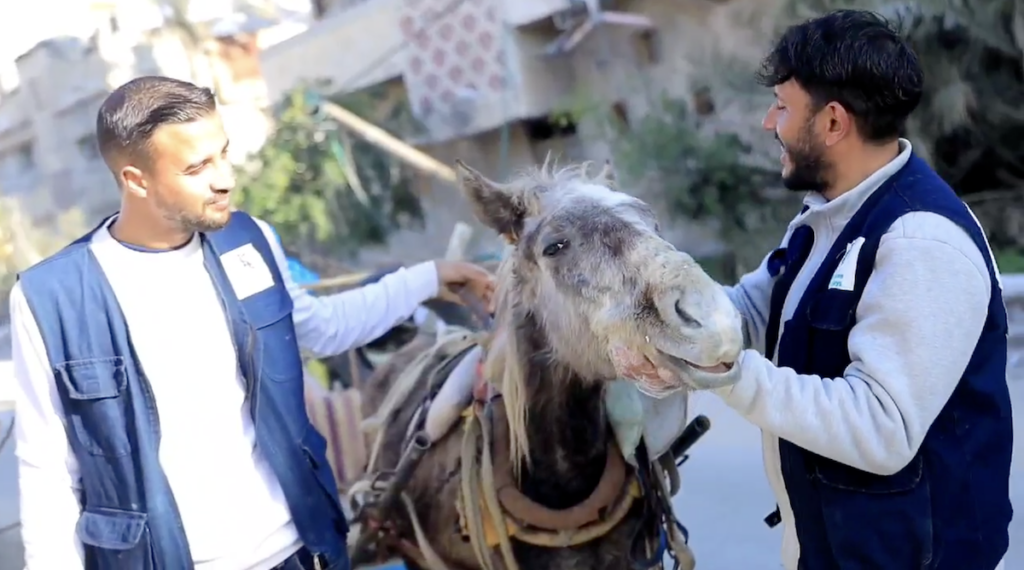
18 January 2025
Tomorrow, our life-saving team will be able to operate safely, which is a great relief for all of us.
Allow me to share my feelings with you all on this occasion of the ceasefire. We are truly exhausted. Every day, I feel anxious and worried—my heart is constantly in my throat, concerned about the team’s safety. The reality is that we do not know most of the people whose animals we treat, and we cannot know if any of them are considered “wanted.” It has been an incredibly nerve-wracking experience, as everything could have ended in a single moment. But thanks to God, we have been kept safe.
I also often think about the late nights when I worked and shared updates with the group. I would write reports and carry out tasks on the roads at night, fully aware of the risks and the ever-present possibility that it could be the end. Yet, by God’s grace, we made it through.
Allow me to express my deepest gratitude to all our kind colleagues who have consistently cared about us and inquired about our safety. Your thoughtfulness and concern have been a source of strength during these challenging times.
To all of you, thank you for your kindness and humanity. You have made an incredible difference, and we are forever grateful.
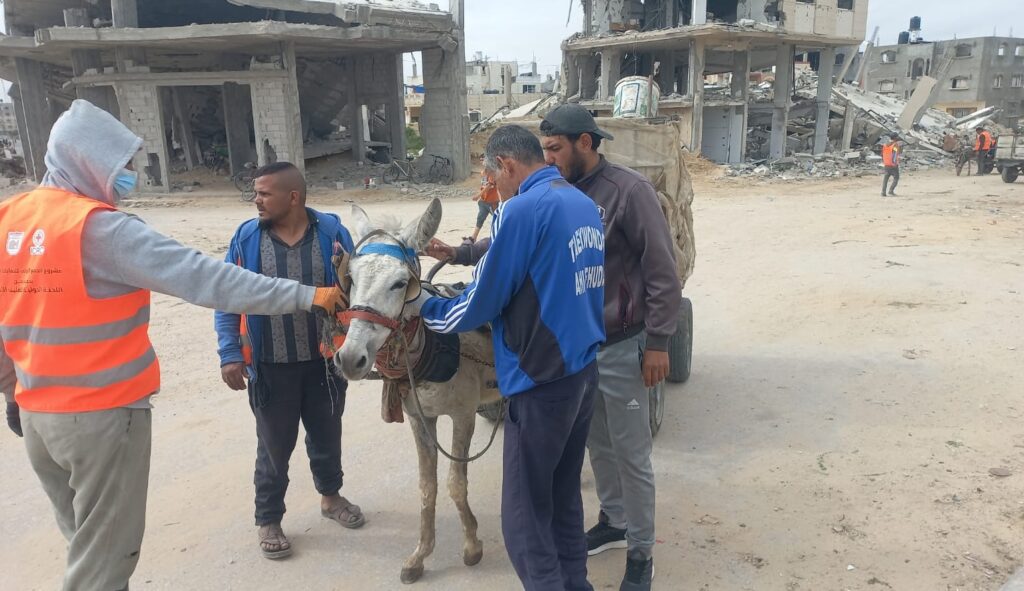
17 January 2025
I’d like to share a heartfelt moment with you that shows the dedication of our team. Even during their rest and off-work hours, we received an urgent message from Ibrahim, the owner of a struggling horse. The poor horse had a severe issue with his feet, causing inflammation, discomfort, and even difficulty walking.
When Ibrahim reached out, we informed him that we would be operating in the town center of Khan Yunis the following morning. However, he pleaded with us, his voice heavy with sadness, saying, “I need to go to Nasar Hospital in Khan Yunis to bring food and clothes to my sick son and wife, who are hungry and cold in this harsh winter.”
His words deeply moved us. Without hesitation, our team decided to step in immediately. Armed with our simple tools, we went to him and treated the horse, repairing its horseshoe and alleviating its pain.
Ibrahim was overwhelmed and speechless with gratitude, and in that moment, we were reminded of the impact small acts of kindness can have—not just on animals, but on their owners as well.
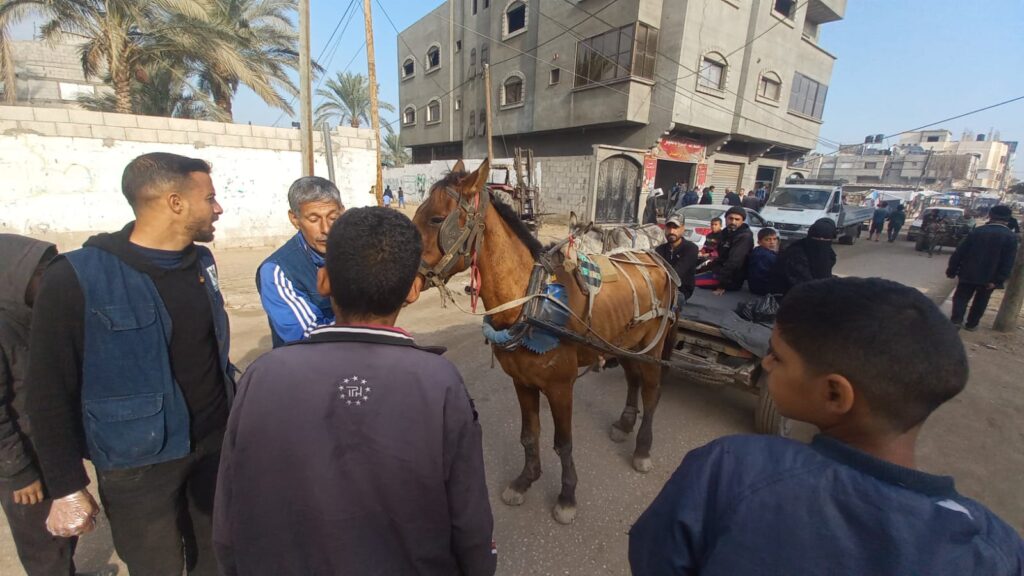
16 January 2025
Our animals are in dire need of peace as well. The owner of this horse said literally to Abu Jyhad that “My horse fell ill after a missile struck very close to him. The impact of the rocket caused him severe shock; he became terrified, uncontrollable and ran frantically in an attempt to survive. Since then, my horse has stopped eating and drinking, which has drastically affected his health. He’s completely different now, and I’m at a loss for what to do. This is why I’m reaching out to you for help.”
There are some stories of hope and love shine through, revealing the deep compassion and sacrifice of those with strong bond with animals. One such story is about our friend and colleague, Mr. Jyhad, and his cherished Arabian mare, a testament to the enduring bond between humans and animals.
Arabian horses are celebrated for their speed, loyalty, beauty, and endurance, and Mr. Jyhad’s mare is a remarkable example. These horses are never used for labor; they symbolize elegance and are often bred for racing or beauty.
Mr. Jyhad raised his mare from a young age, pouring his love and care into her. Despite her value, with Arabian horses often priced between $7,000 and $10,000 at minimum, and some far more, he refuses to sell her. “She is family to me,” he says, even after receiving offers as high as $20,000.
When war forced Mr. Jyhad to flee his hometown of Abasan Aljadeedah, he could not imagine leaving her behind. Together, they moved through nine different locations, from Meraj to Rafah, then to Almwasy in Khan Yunus, and then to Deir Al-Balah, and finally to his hometown Abasan Aljadeedah seeking safety. “My love for her made it impossible to leave her behind,” he shares.
Even in the face of immense loss, including the destruction of his home and the special room he had built for her, his devotion never faltered. During the war, he lived with me together on a farm for three months, where I saw his unwavering care for her firsthand. He treated her as if she were his own child, going to great lengths to ensure she was fed and safe. He even planted grass and weeds in his garden just for her. “I care for her more than I care for my own children,” he often said.
Today, she is healthy, well-fed, and thriving, a reflection of his incredible dedication. Mr. Jyhad’s story is not just about a horse but about Gazans’ compassion, love and sacrifice to animals.
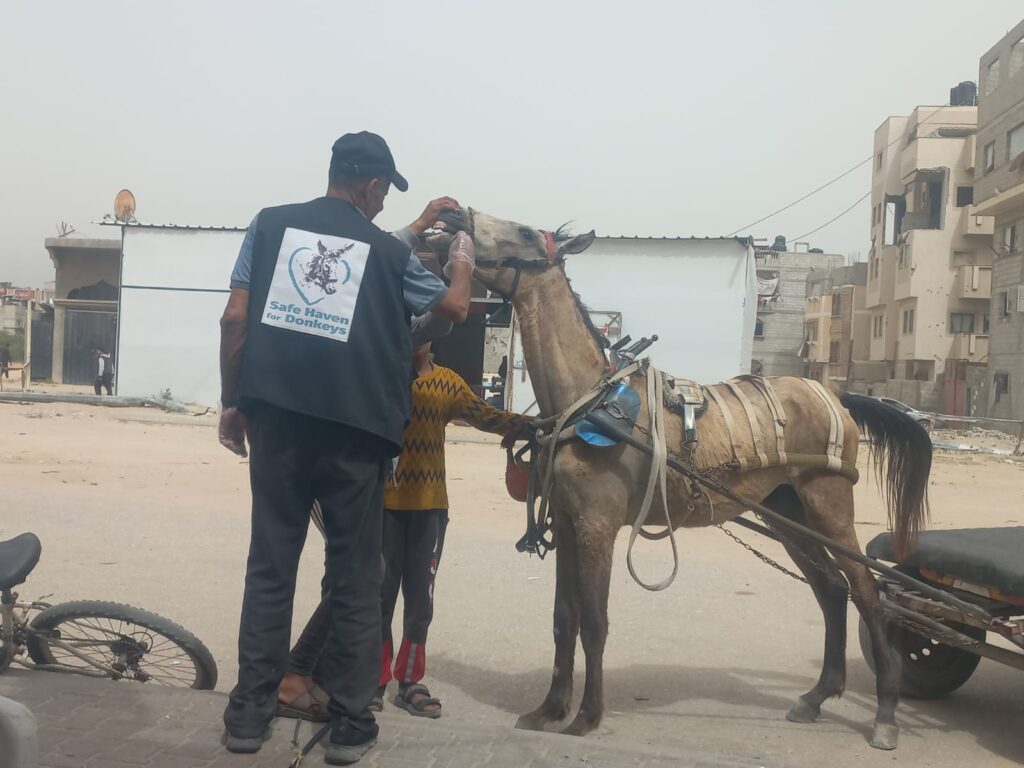
9 January 2025
It deeply saddens me to say that the situation for animals in Gaza is beyond heartbreaking. I don’t think there are animals anywhere on earth facing such unimaginable hardships as Gazans’ animals.
Take this horse, for instance. It was struck by shrapnel and narrowly escaped death while passing through a dangerous area that had been targeted. Despite its injuries, this poor horse must still work—it remains its owner’s only source of hope and livelihood. The owner is doing everything in his power to care for the horse, but the struggle is immense!! The owner sought our help with tears in the eyes, worrying about losing his best friend (the horse). He literally said “I wish I could do everything possible to save and treat my horse”. Another case we encountered today was a donkey in a devastating state. The donkey was so weak and malnourished that it could barely move. Its owner, unable to afford food for the donkey, was watching it slowly succumb to starvation. Overwhelmed with compassion, my brother Mohammed—a deeply devoted advocate for animals—went out of his way to help. He rode his bike to bring a sack of barley, grains he had purchased at a high cost to feed his own children, and gave it to the donkey’s owner to feed the starving donkey.
These stories highlight the indispensable role of Safe Haven for Donkeys in Gaza. Without it, countless animals would have already perished. I firmly believe that it is through God’s mercy and wisdom that Safe Haven for Donkeys arrived in Gaza at this most critical time, providing a lifeline to these innocent creatures and their devoted owners. On behalf of my people, I extend our heartfelt gratitude to all of you for making the impossible possible during these extraordinarily challenging times in Gaza.
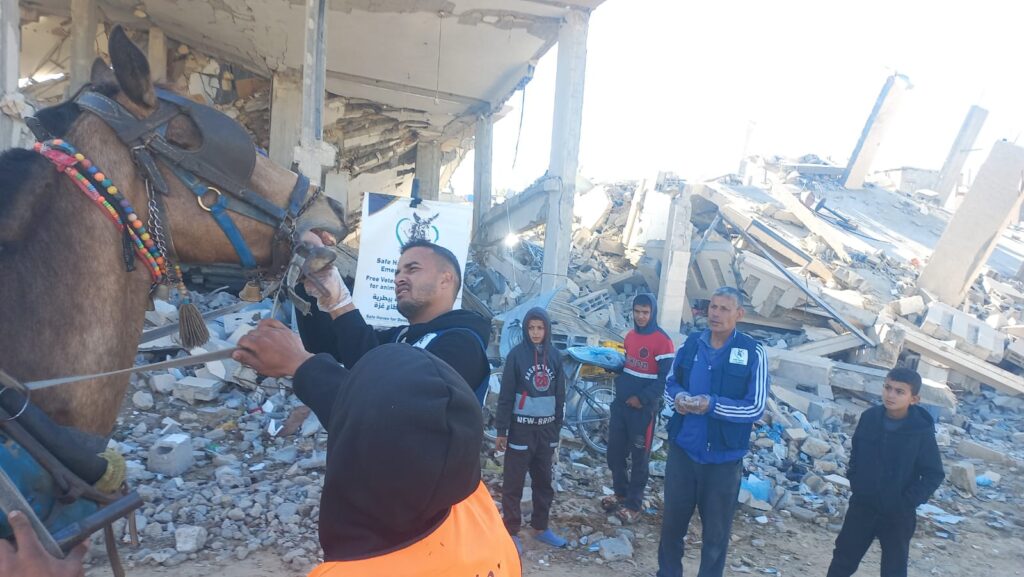
2 January 2025
In a small, quiet village, the love and care for animals stood out as a testament to boundless compassion.
The villagers, even when faced with the hardships of starvation and suffering, never wavered in their commitment to their beloved pets, donkeys, horses, and sheep. Among them was Amal, a young woman whose name means ‘Hope’ in Arabic. Her dedication to her two cats was nothing short of remarkable. She sought our help before.
This time Amal couldn’t make all this long journey; hence, she sent her two sons. She sacrificed the safety of her sons for her two best friends. Is not it somehow hard to find such a sacrifice in any other place on Planet ( sacrifice two sons’s safety where the possibility of being in potential Danger was high _ Unbelievable!!)??!!
Amal’s sons had journeyed all the way from Deir Albalah (17 km away from we are operating this week), a trip the kids undertook solely for the well-being of their mother’s cherished companions. As you can see, the cats are in good condition, well-fed and healthy, thanks to Amal’s unwavering efforts. No matter the cost, Amal and the villagers refused to abandon these loyal animals, showcasing a profound sense of humanity and selflessness.
